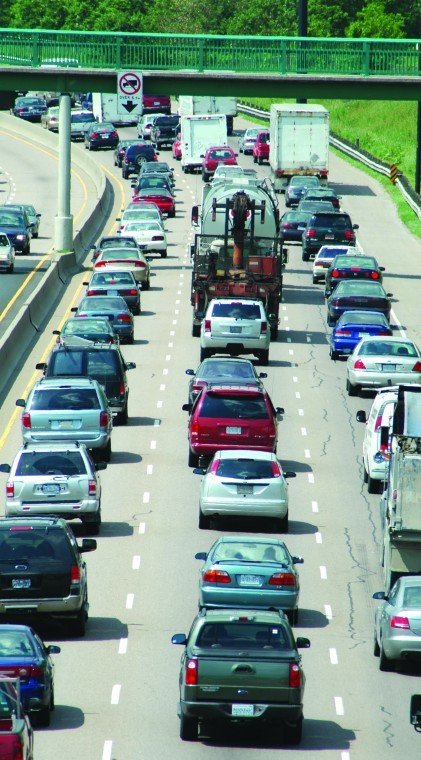Karen Rouse • The Record
aj*****@**********rs.com
Stretched by soaring gas prices and still feeling the sting of recent toll hikes, many commuters are taking a second look at car-pooling, an idea that became popular during the 1970s energy crisis and still can provide perks today – chief among them gas and toll savings.
But before loading up your minivan with co-workers, you may want to consider the tradeoffs that keep some drivers from making the switch.
If you’re fanatical about controlling the radio and dialing in the perfect temperature, or can’t help back-seat driving, car-pooling could offer some challenges. Plus, you lose the “luxury of coming and going as you please,” said car-pooler Daniel Terracciano of Waldwick, N.J.
Then there’s the issue of personal comfort. Can you ride to work, day after day, with people you may not know very well?
“You have to be compatible,” said Terracciano, who car-pools with three other Bergen County residents. “Some people are not morning people. Don’t talk to them or they’ll bite your head off. … Don’t say, ‘I’ll be right there. Wait for me,’ and come at a quarter to seven.
“Now your actions are affecting three other people who have a life, who have a doctor’s appointment to go to, or their child’s play to go to or a second job,” he said.
Devajyoti Deka, a researcher at the Voorhees Transportation Center at Rutgers University, said while rising gas prices often prompt people to take public transportation, few are willing to make the sacrifices necessary to join a car pool. Chief among them, for Deka, is the loss of personal space.
“If you are car-pooling, there has to be a bit of closeness. … It’s not easy to find a match that you would enjoy the 30- to 45-mile ride” with, Deka said.
But if you do take that step, there are potential advantages. For instance, car-poolers pay only $3.50 to cross the Hudson River and can use the high-occupancy vehicle lanes on the New Jersey Turnpike. Some workplaces offer car-pool parking close to the door.
While many car-poolers find their commuting companions on the job, websites like erideshare.com and carpoolworld.com are making it easier to pair solo drivers. The state Department of Transportation also partners with non-profit transportation management agencies around the state such as Wood-Ridge-based Meadowlink to connect drivers with car or van pools.
Krishna Murthy, executive director of Meadowlink and a self-described car-pooling “matchmaker,” said in the last two months, he has seen a spike in calls from people seeking a car-pool buddy to split the cost of the ride to work.
“We are definitely getting more calls than ever before,” said Murthy, whose agency arranges car-pool, van-pool, shuttle and other transportation services not met by NJ Transit’s rail and bus systems.
Many are nervous about it, Murthy said. “It’s the phobia we have about car-pooling with strangers,” he said.
Meadowlink’s car-pool program, called EZRide, eases the awkwardness by serving as the go-between, he said. “We are the folks to make that connection.”
Murthy collects a potential car-pooler’s information, from work hours to destination and preferences – like whether they want to drive or just go along for the ride. He sends out a list of potential partners and, like a good matchmaker, follows up. “We will call them up and say, did you call the people on your list? Did something work, not work?”
Sometimes people “just sit on it,” Murthy said. “Calling a stranger and making that phone conversation is not easy.”
Terracciano and his car-pooling buddies Dave Crowley of Bergenfield and Barry Noonan of Montvale met on the job and were initially part of a large van pool with colleagues from work. When too many members dropped out, they enrolled in EZRide and now split the cost of a roughly $430-per-month commute.
The men meet at 6:30 a.m. at the Fashion Center parking lot off Route 17 in Paramus, pile into one car, and head for the Garden State Parkway. There are no stops for coffee or errands, or fights over which radio station to listen to: They all like the same station. They talk about politics, children and sports. They catch up on office gossip or take naps.
Sometimes they sing, although Terracciano acknowledges that they are “still working on three-part harmony.”
Terracciano, who tracks their costs on a spreadsheet, estimates the daily 75-mile round-trip commute costs $15 for gas and $4.50 for tolls,” roughly $430 for 22 commuting days in March.
The driver of the week covers tolls and gas. A fourth rider in their pool, who declined to be interviewed, does not drive, so he pays his fourth – just over $105 – of the monthly cost to the three drivers. The three drivers also give their cars a break. Instead of driving 75 miles a day, it’s just a three-mile commute to the parking lot where they meet.
As for the downside, Terracciano said he can’t sing in the car pool the way he does when he’s alone. “I’m one of the people you see (in their cars) that you don’t know why they’re screaming,” he joked.
Noonan concedes ride-sharing doesn’t work for everyone.
“It’s an inconvenience because for some people, their car is an extension of themselves and they don’t want to part from their car,” he said. “Their car is sort of their sanctuary.”
Transportation consultant Ben Barkow, a former Madison commuter and author of the Transportation Research Board report “The Psychology of Car-pooling,” said car-pooling is only for the “mature,” people who are willing to negotiate and compromise for the greater good – saving money.
But he acknowledges there is a cultural fear. “The resistance to trying car-pooling resides principally in the reserve people feel to encountering and negotiating with strangers,” said Barkow, who now lives in Ontario.
People also resist because they’re afraid of getting stranded at work in an emergency – for instance, needing to run home for a sick child, he said.
“It’s a common issue in transportation planning,” said Barkow. “You have to have buses running all night because people are afraid they’ll be stranded.”
Meadowlink’s EZRide program, which is free, grants its car-pool members three free cab rides – from work to home only – a year, specifically for such emergencies, said Murthy. Each cab ride is worth about $80 to $100, he said.
For Terracciano, it all comes down to saving money, even if it means losing a little extra sleep, another downside of car-pooling. Hitting the snooze for an extra 15 minutes of sleep can cost a car-pooler more than a ride, he said.
“If I sleep an extra half-hour, I’m going to miss the car pool. If I miss the car pool, it’s going to cost me $20 a day, so that half-hour of extra sleep is worth 20 bucks,” he said. “It equates back to dollars and cents.”
“If it was a $50 difference or even a $100 difference that would maybe be my breaking point,” he said. “I might say it’s not worth losing the freedom of everything.”















